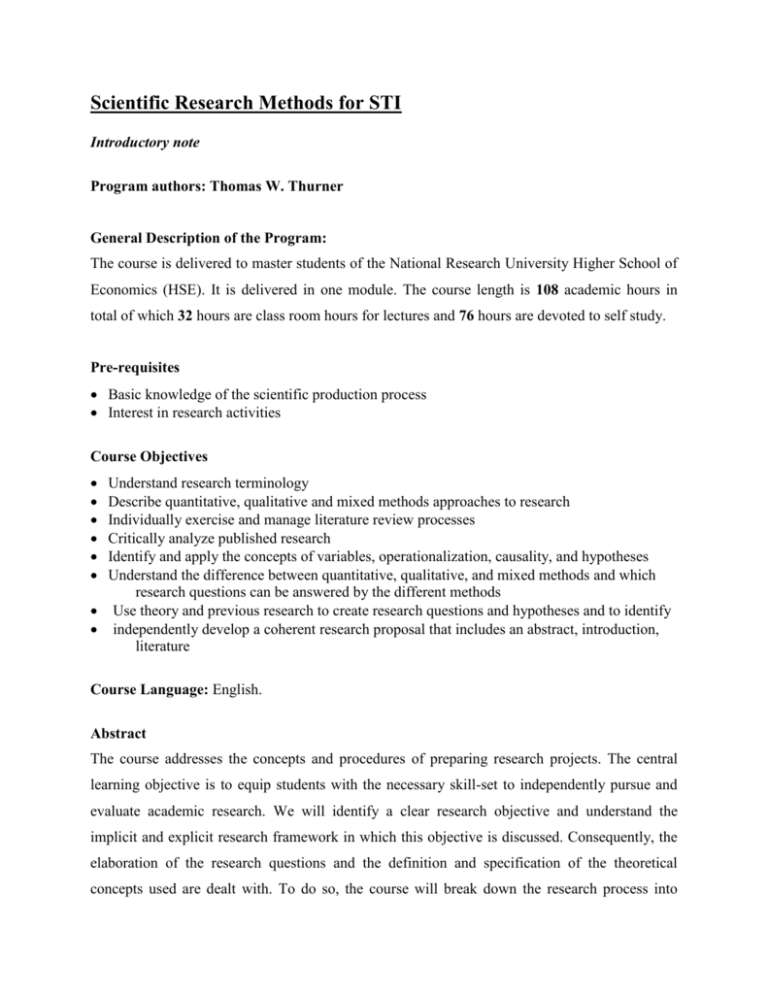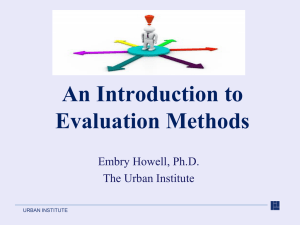Scientific Research Methods for STI
advertisement

Scientific Research Methods for STI Introductory note Program authors: Thomas W. Thurner General Description of the Program: The course is delivered to master students of the National Research University Higher School of Economics (HSE). It is delivered in one module. The course length is 108 academic hours in total of which 32 hours are class room hours for lectures and 76 hours are devoted to self study. Pre-requisites Basic knowledge of the scientific production process Interest in research activities Course Objectives Understand research terminology Describe quantitative, qualitative and mixed methods approaches to research Individually exercise and manage literature review processes Critically analyze published research Identify and apply the concepts of variables, operationalization, causality, and hypotheses Understand the difference between quantitative, qualitative, and mixed methods and which research questions can be answered by the different methods Use theory and previous research to create research questions and hypotheses and to identify independently develop a coherent research proposal that includes an abstract, introduction, literature Course Language: English. Abstract The course addresses the concepts and procedures of preparing research projects. The central learning objective is to equip students with the necessary skill-set to independently pursue and evaluate academic research. We will identify a clear research objective and understand the implicit and explicit research framework in which this objective is discussed. Consequently, the elaboration of the research questions and the definition and specification of the theoretical concepts used are dealt with. To do so, the course will break down the research process into individual identified steps and discuss them in great detail. In general, the course will be an iterative process, by which its individual parts eventually will integrate in a coherent manner. Thereby, the students are familiarized with the existing academic traditions, such as providing proper credits and references. The course focuses on a deep understanding of philosophical assumptions of both qualitative and quantitative research methods. Students will be able to critically reflect on the implications that these assumptions have for the research objective, data collection, analysis, writing, and subsequent dissemination strategies. 1. Thematic Plan a) lectures Topic Project design: developing question(s) & overall research approach Research theories Literature reviews Literature search strategies Quantitative research methods Qualitative research methods Reassembling the pieces: writing Scientific presentation techniques Dissemination strategies Summary Total Total academic hours 16 Lectures (class hours) Self study 4 12 16 8 8 16 16 8 8 16 4 2 2 4 4 2 2 4 4 32 12 6 6 12 12 6 6 12 92 64 2. Basic literature Scientific Writing : A Reader and Writer's Guide Author: Lebrun, Jean-Luc Publisher: World Scientific Date Published: 2007 Scientific Writing : Easy When You Know How Author: Peat, Jennifer Elliott, Elizabeth Baur, Louise Publisher: BMJ Books Date Published: 2002 Writing Science : Literacy and Discursive Power Author: Halliday, M.A.K. Martin, J.R. Publisher: Falmer Press Date Published: 1996 Writing for Science Author: Goldbort, Robert Publisher: Yale University Press 3. Programme Content Topic 1. Project design: developing question(s) & overall research approach Topic outline: Who am I, and if yes, how many? What are possible results? Where do I start? And why is all of that so tricky? Structuring research work Developing research question and hypothesis Main references/books/reading: Leburn, J. “Scientific writing: a reader and writer’s guide” (2007), World Scientific Publishing, London. Holmes, F. L. "Scientific writing and scientific discovery." Isis (1987): 220-235. Williams, M. “Science and Social Science: An Introduction” (1999), Boulder, CO: Westview. Topic 2. Research theories Topic outline: Positivism Realism Constructivism Holistic methods Main references/books/reading: Irwin, A., Michael, M. “Science, Social Theory and Public Knowledge” (2003), McGraw-Hill: Philadelphia. Topic 3. The shoulders of the giant: literature review Topic outline: What are the questions that make the world go round? Finding the niche for your own research Excerpt writing Literature summaries bibliographies Topic 4. Literature search strategies Topic outline: Structured vs. unstructured search strategies Databases and scientific search engines The white, the black, and the gray literature Main references/books/reading: “How to undertake a literature search”, slide set Manchester University Weiss, Newman “A guide to writing articles in energy science”, Applied Energy, 2011. Topic 5. Quantitative methods Topic outline: Statistical analysis… …and what it cannot do Topic 6. Qualitative methods Topic outline: Interviews, case studies and ethnography… …and what it can do Main references/books/reading: Krishnaswami, O.R. Satyaprasad, B.G., “Business Research Methods”, (2010), Himalaya Pub. House. Gillham, B., “Case Study Research Methods”, (2010), Bloomsbury Academic. Topic 7. Reassembling the pieces: writing Topic outline: Structuring scientific papers Requirements to scientific papers Abstract writing Main references/books/reading: No reading required Topic 8. Scientific presentation techniques Topic outline: Structuring presentations Presentation styles Delivering messages Question & answer sessions Main references/books/reading: No reading required Topic 9. Dissemination strategies Topic outline: Where to publish How to publish Why publishing at all? Main references/books/reading: Leburn, J. “Scientific writing: a reader and writer’s guide” (2007). World Scientific.






